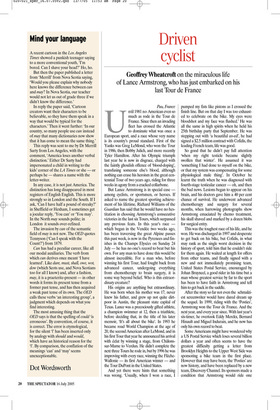Mind your language
A recent cartoon in the Los Angeles Times showed a punkish teenager saying to a more conventional youth, ‘I’m bored. Can I shave your head?’ Ho, ho.
But then the paper published a letter from ‘Merrill’ from Nova Scotia saying, ‘Would you please explain why nobody here knows the difference between can and may? In Nova Scotia, our teacher would not let us out of grade three if we didn’t know the difference.’ In reply the paper said, ‘Cartoon creators want their characters to be believable, so they have them speak in a way that would be typical for the characters.’ Then it went further: ‘In our country, so many people use can instead of may that many dictionaries now show that it has come to mean the same thing.’ This reply was sent to me by Dr Merrill Sarty from Los Angeles, with the comment, ‘America loses another verbal distinction.’ Either Dr Sarty had impersonated a child in writing to the kids’ corner of the LA Times or she — or perhaps he — shares a name with the letter-writer.
In any case, it is not just America. The distinction has long disappeared in most registers of English English. This is more strongly so in London and the South. If I ask, ‘Can I have half a pound of streaky?’ in Sheffield or Hexham, I sometimes get a jocular reply, ‘You can’ or ‘You may’. In the North may sounds polite; in London it sounds over-refined.
The invasion by can of the semantic field of may is not new. The OED quotes Tennyson (‘Can I speak with the Count?’) from 1879.
Can has had a peculiar career, like all our modal auxiliaries. The verb from which can derives once meant ‘I have learned’. Like dare, must, shall, owe, wot, dow (which Scots use, and Nova Scotians too for all I know) and, after a fashion, may, it is a praeterite-present — in other words it forms its present tense from a former past tense, and has then acquired a weak past tense of its own. The OED calls these verbs ‘an interesting group’, a judgment which depends on what you find interesting.
The most amusing thing that the OED says is that the spelling of could ‘is erroneous’. By convention, of course, it is correct. The error is etymological, for the silent ‘l’ has been inserted only by analogy with should and would, which have an historical reason for the ‘l’. By comparison, the conflation of the meanings ‘can’ and ‘may’ seems unexceptionable.


























































 Previous page
Previous page